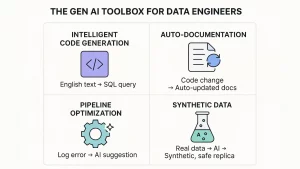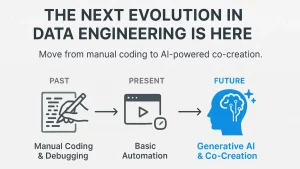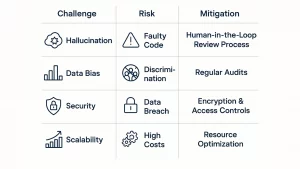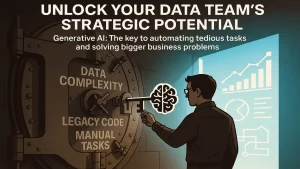How Gen AI is Redefining Data Engineering
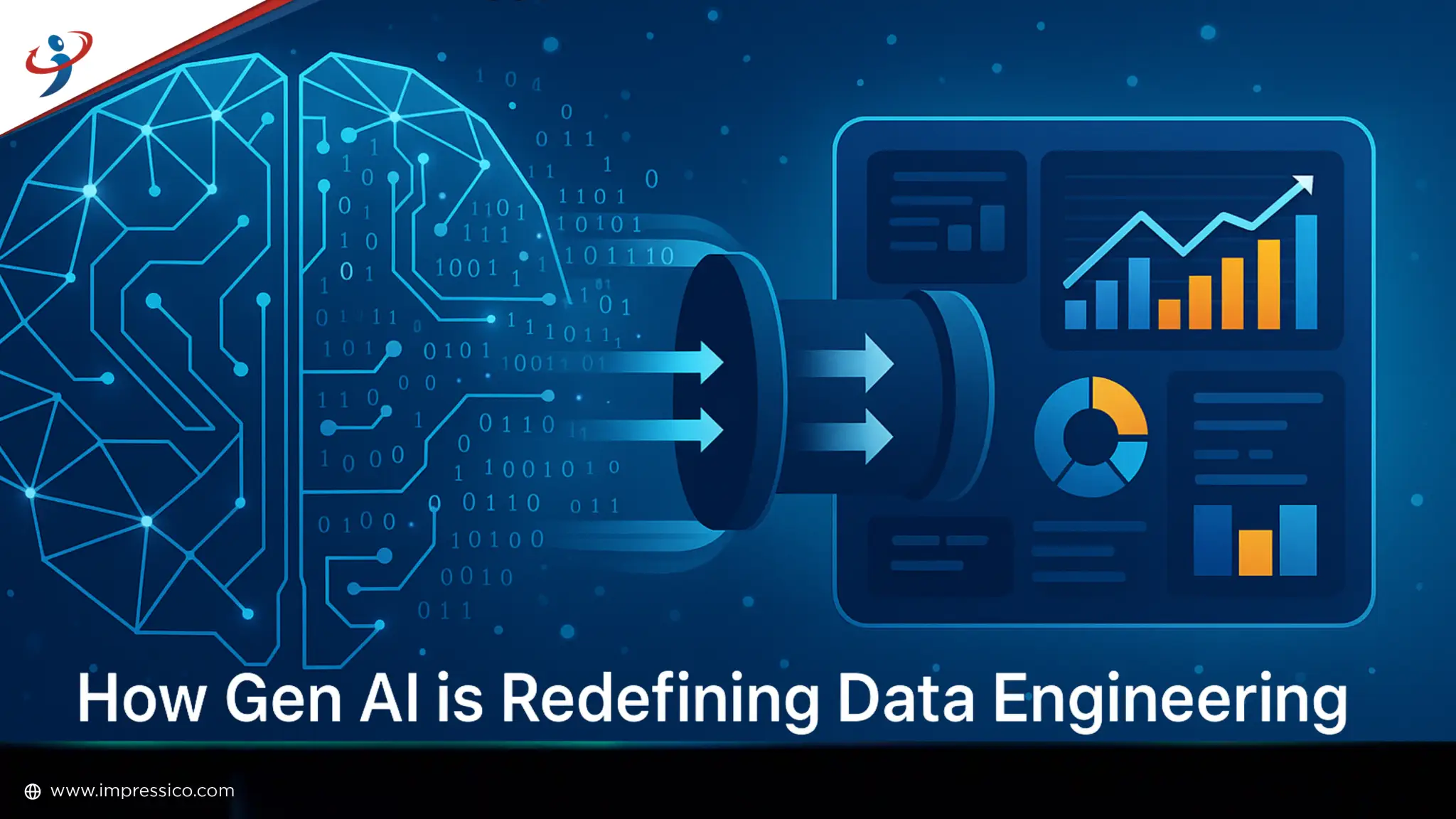
Table of Contents:
The Modern Data Engineer’s Challenge
What is Generative AI in a Data Context?
– Beyond Traditional AI and Machine Learning
Key Areas Where Gen AI is Redefining Data Engineering
– Intelligent Code Generation & Automation
– Smart Data Documentation & Metadata Management
– Proactive Pipeline Optimization & Error Resolution
– Synthetic Data Generation for Testing
The Future Data Engineer: Evolution, Not Replacement
Challenges and Considerations for Implementation
Conclusion: Building the Future, Together
Frequently Asked Questions
The Role of Generative AI in Data Engineering: A New Era of Efficiency
Data engineers in the modern age have to face a daunting task. Everyday, they work with huge amounts of data that come from a variety of formats, systems and sources. They have to create robust pipelines, manage complicated workflows, and serve up data on demand. And companies are seeking results faster than ever before, putting a lot of pressure on the data engineering team to deliver more in less time.
This is the place where a huge changes are occurring. We are moving past simple automation to a future where machines are able to produce code, queries and even documents independently. Instead of replacing human beings it is now about working together. Generative AI is evolving into a co-pilot to help engineers tackle the most difficult aspects of their jobs.
With the use of AI for data engineering companies are now able to create smarter pipelines, solve problems quicker, and keep data more secure. In reality, artificial intelligence in data engineering is setting the scene for a future in which engineers need to be working less on repetitive tasks and instead focus on solving business issues.
Beyond Hype: What is Generative AI in a Data Context?
Generative AI, also known as Gen AI, is a branch of artificial intelligence which can generate new content instead of merely providing insight or predictions from existing data. Models such as GPT, Codex, and other tools are designed to create code, text, SQL queries, and even brand new data models. They are able to learn from patterns that are found in massive data sets, and to create original outputs that are human-like.
This is distinct from traditional AI and machine learning. It was the case that in past times, AI was used for data engineering. It was mostly utilized to make predictions and for analysis. For instance, teams utilized machine learning to predict sales, identify patterns in the data or forecast the demand. It was useful, however it was about working with patterns that were already in place.
Generative AI used for data engineering goes one step further. Instead of merely creating predictions, it develops pipelines and code. It is able to take a simple English query and convert it into an actual SQL query. It is able to write code for data transformation in Python, and to create documentation that describes complicated data structures. In other words it doesn’t just review the past but creates something brand new that engineers can utilize immediately.
Key Areas Where Gen AI is Redefining the Role of a Data Engineer
Generative AI has changed the face of data engineering across many sectors. Let’s take a look at the most significant ones.
Intelligent Code Generation & Automation
The writing of boilerplate code is among the most monotonous tasks in data engineering. Every engineer has spent a lot of time creating the same code for Spark, the dbt platform or Airflow. This is the situation where AI to improve data processing can make a significant impact.
Through Gen AI, engineers can explain what they need in simple English and then create code within a matter of seconds. For instance, if a person asks, “Find monthly sales by region for the past year,” Gen AI can create the exact SQL query required. If a designer requires the use of an Airflow DAG for a data pipeline, the model will make a draft variant that can be reviewed by the user and further customized as needed.
This means that engineers don’t have to spend their time typing routine code, or in fixing syntax issues. Instead, they can concentrate on creating the correct data structure and making sure the system runs efficiently. By automating low-value programming tasks, Gen AI speeds up the development process and allows teams to produce faster.
Smart Data Documentation & Metadata Management
One of the most difficult aspects of data engineering is keeping the documentation current. Columns, tables and pipelines can change frequently but documentation often isn’t up to date. This can make it difficult for people to understand or trust their data.
Generative AI can help solve this problem. It can automatically generate data lineage maps which show where the data originates and how it is distributed across systems. It can provide simple English explanations of complex columns, tables and transforms. If code changes, Gen AI can update the documentation to ensure that it is in line with the current version.
In addition it can respond to natural language queries such as: “Where does this customer table get its data from?” Instead of having to sift through the code, engineers can get answers immediately.
By ensuring that the metadata is fresh and up-to-date, generative AI for data engineering helps strengthen data governance and helps build trust throughout the entire organization.
Proactive Pipeline Optimization & Error Resolution
Data pipelines form the foundation of analytics. Unfortunately, they’re also prone to failure. A small error can end an entire process, and delay reports for several hours. Traditionally, fixing mistakes required a lengthy examination of log files and experimenting with various solutions.
Here, AI in data engineering comes to the rescue. By studying the messages in the logs Gen AI can suggest the best method to improve a query’s performance, select an appropriate join strategy or pinpoint a bottleneck in memory. Gen AI also can analyze log messages and trace stacks to suggest specific solutions.
For instance, if you find that a Spark job fails because of memory issues, the Gen AI tool might suggest changing the size of partitions or employing an alternative execution strategy. Instead of spending hours of their time investigating, engineers can often solve issues in just a few minutes.
This not only saves time but also increases reliability. By reducing errors, Data teams can make sure that the company always has up-to-date, accurate data.
Synthetic Data Generation for Testing
Testing pipelines usually requires real-world data. But using real production data poses security and privacy issues particularly when it contains sensitive fields like customer information.
This is the point where the generative AI to engineer data can prove useful. Gen AI can generate synthetic data that appears and behaves exactly like real data. However, it does not contain any sensitive details. For instance, it can create dummy names for customers, and dummy transactions as well as dummy addresses that have the same patterns as real data.
Synthetic data enables teams to test their pipelines, verify transformations, as well as test new features in a safe manner. It ensures that they are in compliance with privacy laws, while still conducting the thorough testing required to create robust systems.
Don’t get left behind in the AI revolution.
Partner with us to build smarter, faster, and more reliable data systems. Let’s discuss your data engineering challenges.
Contact Us Today to Get Started
The Future Data Engineer: Evolution, Not Replacement
Whenever AI is discussed, the greatest fear is the loss of work. Many data engineers worry that machines will take over their jobs. In reality, Generative AI isn’t here to replace us, but rather to strengthen our position.
AI for data engineering acts like a support system. It can take over monotonous tasks such as the writing of boilerplate code, constructing queries and keeping documentation up-to-date.
This allows human engineers to concentrate on more interesting and creative tasks like:
- Constructing reliable data models
- Architecting scalable data systems
- Security and governance management
- Overseeing AI-assisted development
- Ensuring ethical use of data
The role of engineers is shifting from programming every single detail to leading the review and management of intelligent systems. This change will make the job much more interesting, creative, and strategic, instead of just mechanical. Instead of becoming obsolete, they will take on the role of leaders in shaping the way AI is applied to business issues.
Challenges and Considerations
Although the benefits are evident, there are also some difficulties in making use of Gen AI in data engineering.
- Hallucination and Accuracy AI often creates code that looks right but isn’t actually correct and cannot be executed. Engineers have to check and verify the outputs.
- Security and Governance Utilizing an external AI’s APIs raises concerns about how data from companies is stored and secured. A strong governance system is crucial.
- Cost Management The operation of large-scale AI simulations can become costly. Teams must monitor costs closely.
- Skill Shift Engineers need to learn new skills, like quick engineering and AI supervision. This requires controlling the AI, using the right inputs, and knowing when to take over.
If these issues are addressed early, companies can derive a lot of value from AI without taking unnecessary risks.
Conclusion: Building the Future, Together
Generative AI is more than a new trend; it is revolutionizing the way teams work with data. From writing code to documenting pipelines, from enhancing them to producing reliable test data, it’s making data engineering more efficient and smart as well as more secure.
It is important to view this as a partnership and not as substitution. With these instruments, data engineers can concentrate on innovation, strategy, and solving problems. The future of AI and engineering data is all about machines and humans, and how they are able to work together to create more efficient systems and provide quicker answers.
FAQ: How Gen AI is Redefining Data Engineering
-
How is Generative AI different from traditional AI in data engineering?
Traditional AI predicts and analyzes patterns, while Generative AI creates new content like SQL queries, code, and documentation.
-
Will Generative AI replace data engineers?
No. It will not replace them but will transform their role. Engineers will focus more on strategy, governance, and oversight.
-
What are the most practical uses of Gen AI for a data engineer today?
Code generation, pipeline optimization, data documentation, and synthetic data creation.
-
What are the biggest risks of using Generative AI in data engineering?
Hallucination in code, data security issues, high costs, and the need for new skills.
-
How does Generative AI help with data documentation?
It automatically generates plain-English descriptions and updates metadata in real time.
-
Can Generative AI build entire data pipelines?
Yes, it can generate pipeline code and workflows, but engineers must still review and refine them.
-
What skills should a data engineer develop to work with Generative AI?
Prompt engineering, AI oversight, system architecture, and governance.
-
What is synthetic data generation, and why is it useful?
It is the process of creating dummy but realistic data for testing. It helps protect sensitive information while ensuring thorough testing.
Key Takeaways:
🤖 Generative AI is a Co-pilot, Not a Replacement: It automates tedious tasks like boilerplate code writing, documentation, and pipeline monitoring, freeing data engineers to focus on strategic architecture and problem-solving.
⚡ Four Immediate Applications: The most impactful use cases today are:
- Intelligent Code & Query Generation
- Automated Data Documentation & Lineage
- Proactive Pipeline Optimization & Error Resolution
- Secure Synthetic Data Generation for Testing
⚠️ Governance is Paramount: While powerful, Gen AI introduces risks like code “hallucination,” data security concerns, and cost management, requiring strong oversight and governance frameworks.
🧭 The Role is Evolving: The data engineer of the future will need skills in prompt engineering, AI system oversight, and data governance, shifting from hands-on coding to strategic management of AI-assisted development.
The Bottom Line: Generative AI is fundamentally making data engineering more efficient, intelligent, and secure, marking a shift from manual execution to strategic leadership.
Ready to transform your data engineering with Generative AI?
Our experts can help you integrate intelligent automation into your pipelines, from code generation to proactive monitoring.
